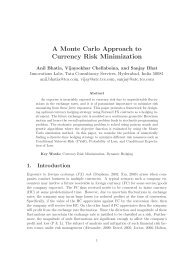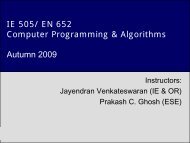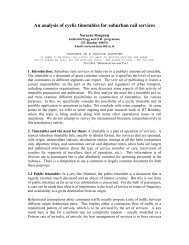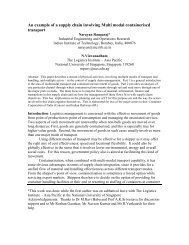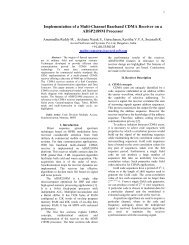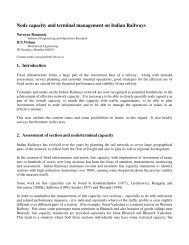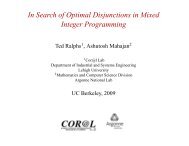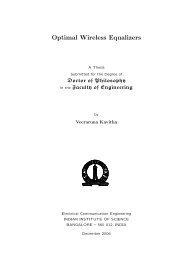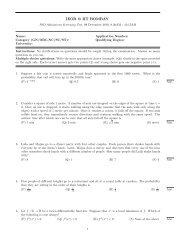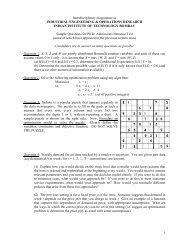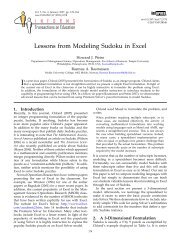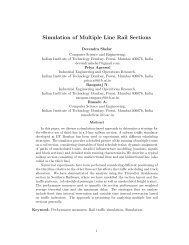Opportunistic Scheduling in Cellular Systems in the Presence of ...
Opportunistic Scheduling in Cellular Systems in the Presence of ...
Opportunistic Scheduling in Cellular Systems in the Presence of ...
Create successful ePaper yourself
Turn your PDF publications into a flip-book with our unique Google optimized e-Paper software.
1768 IEEE TRANSACTIONS ON INFORMATION THEORY, VOL. 58, NO. 3, MARCH 2012<br />
VII. CONCLUDING REMARKS<br />
We studied centralized downl<strong>in</strong>k transmissions <strong>in</strong> a cellular<br />
network <strong>in</strong> <strong>the</strong> presence <strong>of</strong> noncooperative mobiles. We modeled<br />
this as a signal<strong>in</strong>g game with several players serv<strong>in</strong>g as<br />
leaders that send signals and with <strong>the</strong> BS serv<strong>in</strong>g as a follower.<br />
In <strong>the</strong> absence <strong>of</strong> extra <strong>in</strong>telligence, only <strong>the</strong> babbl<strong>in</strong>g equilibrium<br />
is obta<strong>in</strong>ed where both <strong>the</strong> BS and <strong>the</strong> noncooperative<br />
players make no use <strong>of</strong> <strong>the</strong> signal<strong>in</strong>g opportunities. We <strong>the</strong>n proposed<br />
three approaches to obta<strong>in</strong> an efficient equilibrium (TRE),<br />
all <strong>of</strong> which required extra <strong>in</strong>telligence from <strong>the</strong> BS but resulted<br />
<strong>in</strong> <strong>the</strong> mobiles signal<strong>in</strong>g truthfully. We fur<strong>the</strong>r showed <strong>the</strong> existence<br />
<strong>of</strong> o<strong>the</strong>r <strong>in</strong>efficient equilibria at which a noncooperative<br />
mobile achieves a better utility than at a TRE; <strong>the</strong> BS achieves<br />
better utility than that at a babbl<strong>in</strong>g equilibrium but a lower value<br />
than that at a TRE.<br />
We see several avenues open for fur<strong>the</strong>r research on schedul<strong>in</strong>g<br />
under noncooperation. We recall that we assumed that<br />
a player is ei<strong>the</strong>r cooperative or not. What if <strong>the</strong> player can<br />
choose? Prelim<strong>in</strong>ary research show that <strong>the</strong>re is no clear answer:<br />
it depends on <strong>the</strong> channel statistics <strong>of</strong> <strong>the</strong> player as well as that<br />
<strong>of</strong> o<strong>the</strong>rs. Ano<strong>the</strong>r related question is, what if <strong>the</strong> BS does not<br />
know whe<strong>the</strong>r a mobile cooperates or not?<br />
The objective <strong>of</strong> throughput maximization used by BS favor<br />
a few strong users with “relatively best” channel, <strong>the</strong>reby<br />
result<strong>in</strong>g <strong>in</strong> unfair resource allocation. In [18], Kushner and<br />
Whit<strong>in</strong>g studied a stochastic approximation based algorithm<br />
that achieves generalized alpha fairness. In [14], we show that<br />
this algorithm is not robust to noncooperation. We fur<strong>the</strong>r proposed<br />
a modification <strong>of</strong> <strong>the</strong> corrective SA algorithm to make it<br />
robust once aga<strong>in</strong> to noncooperation and yet be fair to all users.<br />
APPENDIX A<br />
PROOF OF THEOREM 1<br />
By def<strong>in</strong>ition, at any PBE, for any , and for any<br />
, (see <strong>the</strong> first equation at <strong>the</strong> bottom <strong>of</strong> <strong>the</strong> page). Given ,<br />
<strong>the</strong> mobile utility does not depend on ,<br />
and so (32) at <strong>the</strong> bottom <strong>of</strong> <strong>the</strong> page holds, with be<strong>in</strong>g<br />
<strong>in</strong>dependent <strong>of</strong> . Thus for some probability<br />
distribution on , for all and , i.e., <strong>the</strong><br />
optimal signal<strong>in</strong>g policy does not depend upon . However<br />
can depend on as need not be identical across<br />
mobiles.<br />
With <strong>the</strong> above, for any<br />
and for any<br />
with<br />
, Def<strong>in</strong>ition 2.2 yields<br />
When<br />
, <strong>the</strong> denom<strong>in</strong>ator is zero, but we may set<br />
for such . This implies that <strong>in</strong><br />
equilibrium <strong>the</strong> posterior beliefs cannot be improved.<br />
For any<br />
, <strong>the</strong> first optimization <strong>in</strong> <strong>the</strong> def<strong>in</strong>ition<br />
<strong>of</strong> PBE becomes<br />
The above optimization is <strong>in</strong>dependent <strong>of</strong><br />
hence <strong>the</strong> optimization reduces to maximiz<strong>in</strong>g<br />
and<br />
justify<strong>in</strong>g <strong>the</strong> def<strong>in</strong>ition <strong>of</strong> <strong>in</strong> <strong>the</strong> statement <strong>of</strong> <strong>the</strong><br />
<strong>the</strong>orem.<br />
S<strong>in</strong>ce for all , <strong>the</strong> optimization<br />
<strong>in</strong> (32) can be rewritten as shown <strong>in</strong> <strong>the</strong> last equation<br />
at <strong>the</strong> bottom <strong>of</strong> <strong>the</strong> page, where <strong>the</strong> last <strong>in</strong>equality follows because<br />
<strong>the</strong> term with<strong>in</strong> square brackets does not depend on<br />
and<br />
. The objective function is thus a constant<br />
over <strong>the</strong> variable <strong>of</strong> optimization , and <strong>the</strong>refore<br />
can be any fixed<br />
. This concludes <strong>the</strong> pro<strong>of</strong>.<br />
(32)



